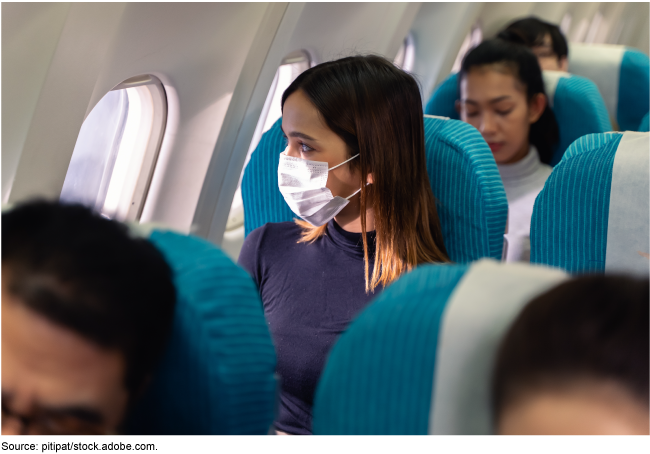Air Travel and Communicable Diseases: Federal Leadership Needed to Advance Research
Fast Facts
Concerns about air travel's role in disease transmission have intensified during the COVID-19 pandemic. Researchers have examined how factors like aircraft boarding methods affect the exposure risk of passengers and crew members.
However, stakeholders said more research involving real-world situations and human behavior is needed and could guide actions to protect public health. Stakeholders noted a lack of federal leadership to advance such research.
Congress should consider directing FAA to develop and implement a strategy for research on communicable diseases in air travel, in coordination with other federal agencies and external partners.

Highlights
What GAO Found
GAO identified research conducted on communicable diseases in air travel in several areas. For example, research has examined how air moves in aircraft and studied the effect of different airline operations—such as boarding aircraft from back to front—on the risk of disease exposure. However, stakeholders GAO interviewed described the need for more research involving real-world situations and human behavior. Additional research could inform the development of evidence-based mitigation measures, policy, and regulations to protect public health. Stakeholders cited several challenges, particularly the lack of federal leadership to facilitate interdisciplinary research and address gaps, to conducting research on communicable diseases in air travel. Stakeholders said researchers' inability to access aircraft, airports, or data also poses challenges to performing needed research.
Examples of Conditions or Behaviors That May Affect Disease Transmission on an Airplane

Several agencies have focused on those research areas most relevant to their priorities and mission. Such agencies include the Department of Health and Human Services (HHS), the Department of Transportation's Federal Aviation Administration (FAA), and the Department of Homeland Security (DHS). None of these agencies have undertaken efforts to advance needed research on communicable diseases in air travel more broadly. Officials with each of these agencies said a more coordinated federal approach to identify and advance relevant research could generate valuable information and inform policy development and guidance. In addition, bringing various federal agencies' assets to bear could link researchers with aviation stakeholders across areas of expertise, provide clearer access to federal funding for research, and help identify needed research across different disciplines.
While FAA acknowledges that it has broad authority to conduct and sponsor research on communicable diseases in air travel, the agency has historically maintained that this work lies outside its core responsibility for aviation safety. Yet, FAA has prior experience conducting and supporting such research, as well as strong aviation industry ties critical to advancing needed research. In particular, FAA has undertaken related research in the past—usually in response to statutory mandates—including work on disease transmission in aircraft cabins. Moreover, leading the development of a coordinated strategy would be consistent with FAA's efforts to develop a national aviation-preparedness plan, in coordination with DHS and HHS, as GAO recommended. Such a strategy would help focus research efforts to better inform the development of policies and requirements to protect the health of passengers and crew.
Why GAO Did This Study
The COVID-19 pandemic has intensified ongoing concerns about air travel's role in spreading disease and raised questions about the safety of passengers and crew. Research that could provide quality information on communicable diseases in air travel can help to protect public health.
The CARES Act includes a provision for GAO to monitor and report on federal efforts related to the COVID-19 pandemic. GAO was also asked to review research on disease transmission in air travel. This report examines: (1) the status of research on communicable diseases in air travel, including stakeholders' views on additional needed research and challenges to conducting it, and (2) the extent to which FAA and other federal agencies are advancing such research.
To conduct this work, GAO interviewed stakeholders, including federal officials, researchers, and aviation industry and union representatives. GAO also reviewed academic literature and agency documents, including research plans, as well as key considerations for interagency collaboration.
Recommendations
Congress should consider directing FAA to develop and implement a strategy to identify and advance needed research on communicable diseases in air travel, in coordination with appropriate federal agencies—such as DHS and HHS—and external partners.
Matter for Congressional Consideration
| Matter | Status | Comments |
|---|---|---|
| Congress should consider directing FAA to develop and implement a strategy to identify and advance needed research on communicable diseases in air travel, in coordination with appropriate federal agencies, such as DHS and HHS, and external partners. In alignment with leading practices for interagency collaboration, this strategy should, at a minimum, clearly identify the roles and responsibilities for participating agencies, determine the resources needed, and document any relevant agreements. (Matter for Consideration 1) | As of February 2025, legislation designed to address this issue has not been introduced in the 119th session of Congress. We will continue to monitor congressional efforts regarding this recommendation. |
